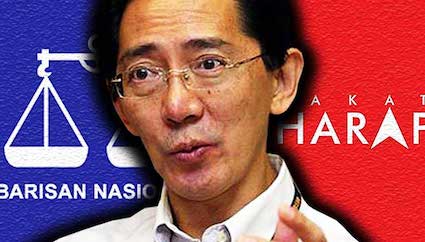Wealth redistribution?

Kua Kia Soong. The Sun Daily
CONSIDERING the cost of living and deteriorating income inequality in our country contributed to the sacking of the Barisan Nasional government, one wonders first of all what the objective is in forming a Council of Elders (Bernama reports its now eminent advisers) and secondly whether the choice of Malaysia’s wealthiest persons, Robert Kuok, Daim Zainuddin in the newly minted “Council of Elders” will achieve that objective by prioritising wealth redistribution.
Robert Kuok is none other than the richest man in Malaysia with a net worth of RM60 billion. No doubt he is in the council because of his links with the Chinese leaders in China and financial nous. Daim Zainuddin is certainly one of the richest Malays in Malaysia. In fact, I remember PKR Youth chief Shamsul Iskandar Mohd Akin had questioned why former finance minister Tun Daim Zainuddin was left out of the list of Malaysia’s 40 richest individuals compiled by Malaysian Business magazine in 2014. By the time he became finance minister in 1984, his total net assets were estimated at nearly RM1 billion.
During the 1990s, academics including Edmund Terence Gomez and Jomo KS, regarded Daim as the most powerful figure in the Malaysian corporate scene. Besides these fabulous Forbes wealthiest, Prime Minister Tun Dr Mahathir Mohamad’s eldest son Datuk Mokhzani Mahathir is also among Malaysia’s 50 richest with a net worth of more than RM1 billion.
To remind Malaysians, Malaysia’s richest 50 persons have a total wealth of US$70 billion or more than RM280 billion while the total wealth of our B40 is only RM20 billion. EPF has revealed that only 22% of the 6.7 million Employees Provident Fund (EPF) active contributors aged 54 have sufficient savings of RM196,800 or more to sustain them during retirement. In other words, income inequality is getting worse and there is no proper welfare system for Malaysians, the majority of whom do not earn enough to be able to have a retirement, never mind the others who lose their jobs or are retrenched.
No doubt these corporate giants will know how to balance the country’s financial accounts but do they have the inclination – never mind the political will – to call for wealth redistribution and to narrow the gaping income inequality in this country?
It is clear that the increasingly serious gap in income inequality needs to be addressed through progressive taxation on high-income earners, their property and capital gains and effective tax laws to ensure there are no tax loopholes for the super-rich. In fact, the replacement revenue for the scrapped GST should come out of such progressive income tax and taxing capital gains and dividends; limiting tax deductions for the rich. Rigorous legislation is vital if we are to curb the practice of transfer pricing that enables the largest corporations to stash their profits in off-shore tax free havens.
Capital allowances and tax holidays for foreign firms must be reviewed while a tax should be imposed on all international financial transactions and hedge funds.
Ultimately, as Dr Jomo Sundaram can very ably lecture the prime minister and Council of Elders, the solution to the serious problem of growing inequality and obscene wealth disparity is a question of socio-economic class.
Kua Kia Soong is adviser to Suaram.

